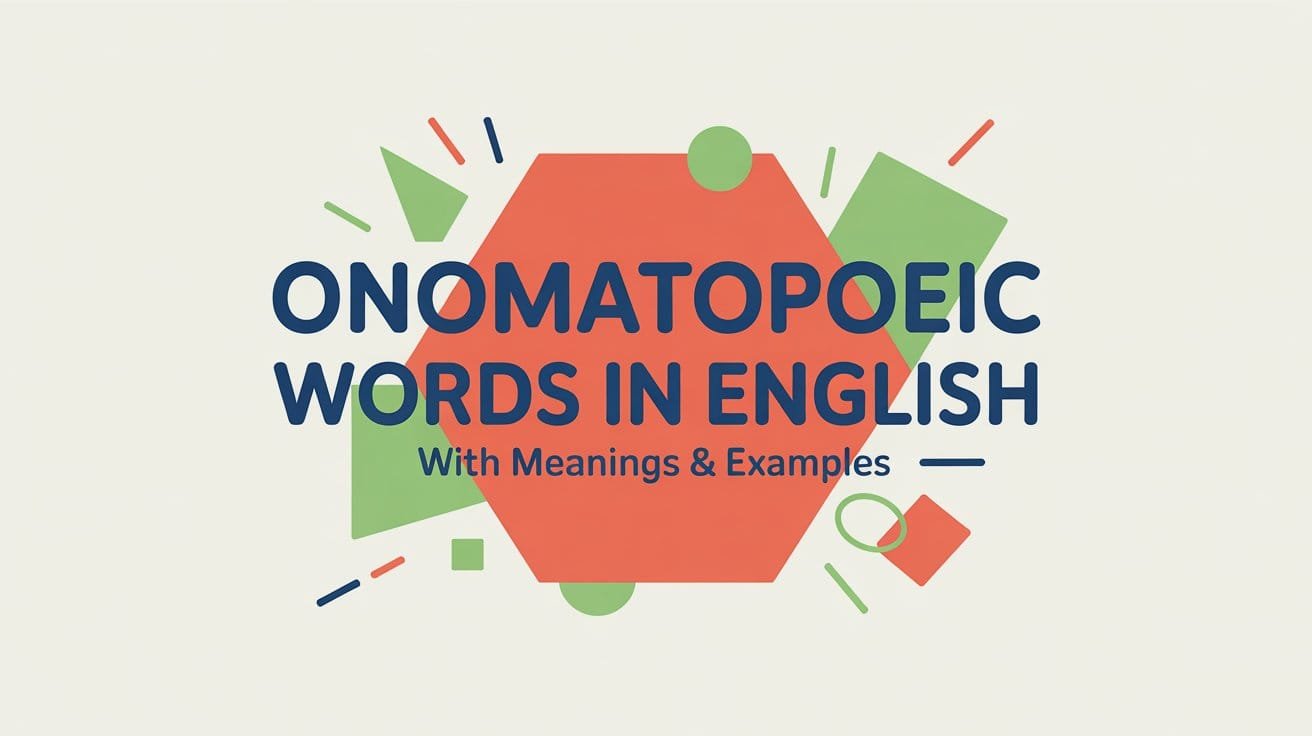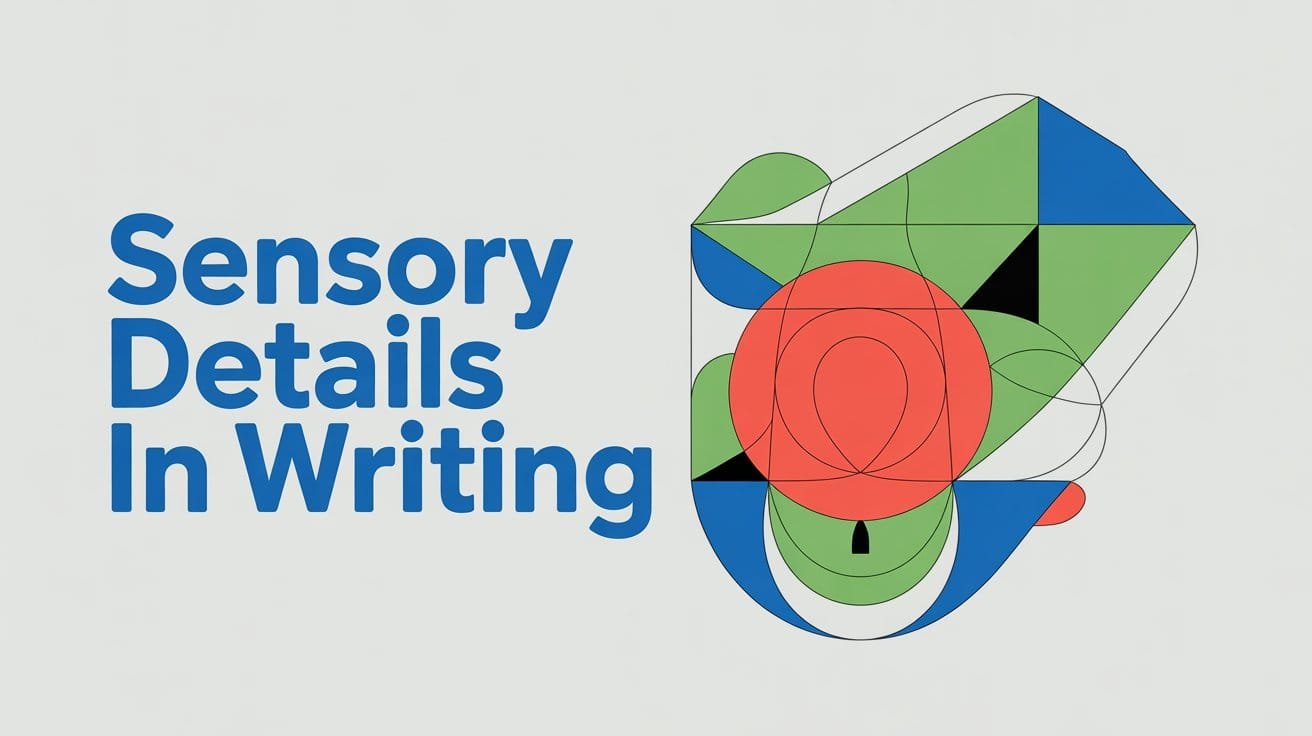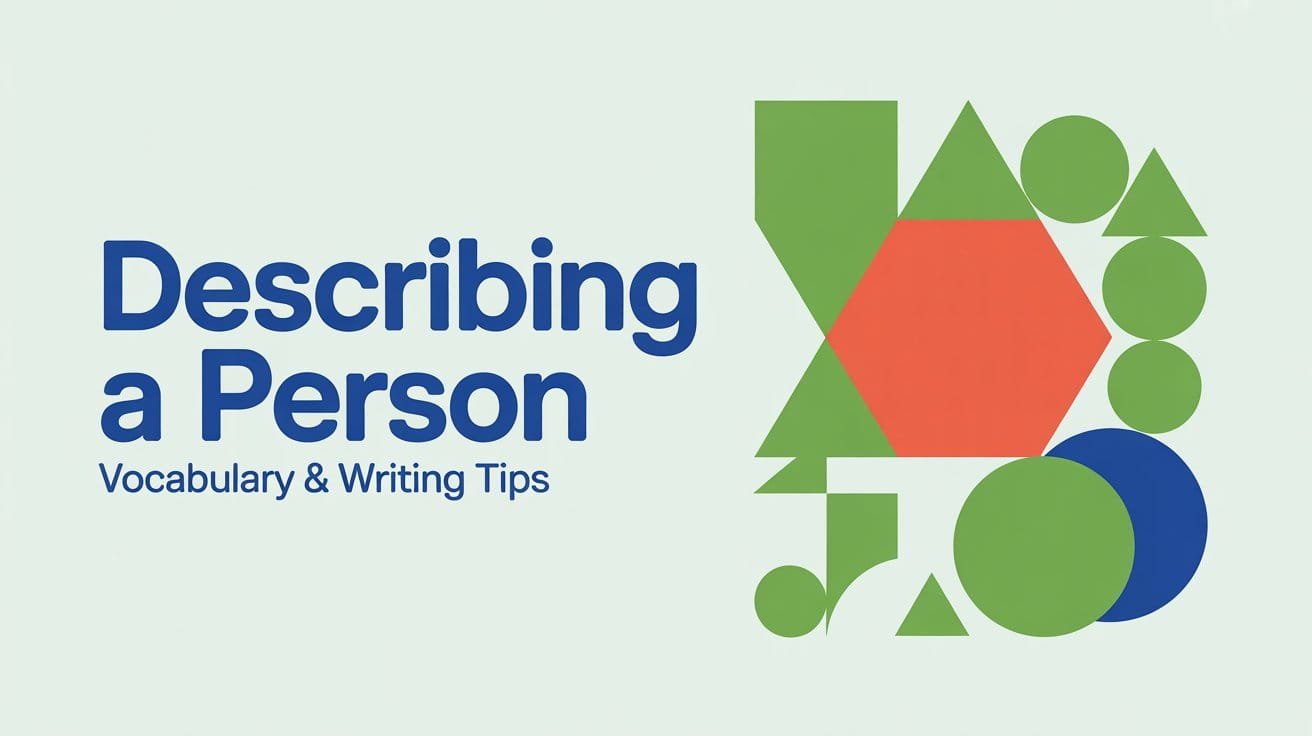Have you ever noticed words that sound exactly like the noises they describe? Words such as “splash,” and “meow” instantly create vivid sounds in your imagination. These expressive words are called onomatopoeic words. Understanding and using these sound words can make your conversation and writing lively, descriptive, and engaging.
In this article, you’ll discover 150 onomatopoeic words, neatly categorized with meanings and examples to help you use them confidently in your writing and speaking.
What Are Onomatopoeic Words?
Onomatopoeic words are words that imitate or mimic the real-life sounds they describe. When you say these words aloud, they closely match the sounds they represent—like “buzz” (the sound of bees), “drip” (water droplets), or “crash” (a loud impact).
Onomatopoeia is more than just a fun language feature; it’s an effective literary device often used to bring scenes, actions, and moments vividly to life. They’re particularly popular in creative writing, poetry, comics, children’s books, and everyday speech, as they instantly help readers hear and visualize the described sound.
Here are a few quick examples to illustrate:
- “The birds chirped happily in the morning.”
- “Water splashed as we jumped into the lake.”
- “The bacon sizzled deliciously in the pan.”
Animal Sounds (Onomatopoeia Examples)
Animals make distinct sounds; English captures many of these with onomatopoeic words. These sound words can add realism and interest to your writing or storytelling, especially when describing animals or nature.
Here is a helpful list of animal-related onomatopoeic words, each accompanied by the animal it’s associated with and a simple example sentence:
- Meow (cat)
Example: “The kitten began to meow when it was hungry.” - Woof (dog)
Example: “Our dog always woofs loudly when someone knocks.” - Bark (dog)
Example: “The neighbor’s dog barked all night.” - Moo (cow)
Example: “The cows in the field were gently mooing.” - Neigh (horse)
Example: “The horses neighed as we approached the barn.” - Roar (lion/tiger)
Example: “The lion’s powerful roar echoed through the jungle.” - Hiss (snake)
Example: “The snake hissed and raised its head.” - Oink (pig)
Example: “The piglets oinked happily in the mud.” - Quack (duck)
Example: “Ducks quacked loudly by the lake.” - Cluck (hen)
Example: “The hens clucked quietly in the coop.” - Ribbit (frog)
Example: “At night, frogs ribbit near the pond.” - Croak (frog)
Example: “We heard frogs croaking after the rain.” - Buzz (bee)
Example: “The garden was alive with bees buzzing.” - Chirp (bird)
Example: “Birds started chirping at sunrise.” - Tweet (bird)
Example: “Small birds tweeted from the branches.” - Baa (sheep)
Example: “The sheep baaed gently on the hillside.” - Howl (wolf)
Example: “We heard wolves howling in the distance.” - Hoot (owl)
Example: “The owl hooted softly at night.” - Bleat (goat)
Example: “The goats were bleating for food.” - Gobble (turkey)
Example: “The turkey gobbled when it saw the farmer.” - Bray (donkey)
Example: “The donkey brayed loudly every morning.” - Trumpet (elephant)
Example: “The elephant trumpeted as it approached the watering hole.” - Squeak (mouse)
Example: “The mouse squeaked as it scurried away.” - Snort (pig/horse)
Example: “The horse snorted and shook its mane.” - Growl (bear/dog)
Example: “The bear growled softly, warning us to keep away.” - Screech (bird)
Example: “The eagle screeched and soared higher.” - Yelp (dog)
Example: “The puppy yelped when its paw got stuck.” - Whinny (horse)
Example: “The mare whinnied gently when she saw her foal.” - Caw (crow)
Example: “Crows cawed loudly from the trees.” - Warble (bird)
Example: “The songbird warbled beautifully in the garden.”
Nature Sounds (Onomatopoeia Examples)
Nature is full of sounds, from gentle rainfall to crashing waves. Using onomatopoeic words to describe these sounds adds depth and sensory appeal to your writing, helping readers feel immersed in your descriptions.
Here’s a list of nature-related onomatopoeic words with easy-to-understand examples:
- Splash (water hitting a surface)
Example: “The children splashed happily in the pool.” - Drip (small drops falling)
Example: “Water dripped steadily from the leaking faucet.” - Rustle (soft sound of leaves)
Example: “Leaves rustled gently in the evening breeze.” - Crash (waves or falling objects)
Example: “Huge waves crashed against the rocks.” - Crackle (fire or dry leaves)
Example: “The logs crackled warmly in the fireplace.” - Patter (light rain)
Example: “Rain pattered softly on the window.” - Whoosh (fast-moving wind or air)
Example: “A sudden gust of wind whooshed through the open window.” - Gurgle (flowing water)
Example: “The stream gurgled quietly as it flowed over rocks.” - Rumble (distant thunder)
Example: “Thunder rumbled across the dark sky.” - Sizzle (hot surface meeting water)
Example: “Raindrops sizzled as they hit the hot pavement.” - Bubble (boiling water or air rising through liquid)
Example: “The water began to bubble gently as it boiled.” - Slosh (liquid moving in a container)
Example: “Water sloshed around inside the bucket as I walked.” - Crunch (dry leaves or snow underfoot)
Example: “Our feet crunched through the fresh snow.” - Clap (sharp sound like thunder or applause)
Example: “Lightning flashed, followed by a loud clap of thunder.” - Babble (a flowing brook or stream)
Example: “We relaxed beside a gently babbling brook.”
Human Sounds (Onomatopoeia Examples)
People produce a variety of sounds to communicate emotions, reactions, or physical sensations. Describing these sounds with onomatopoeic words brings clarity and realism to your writing.
Below are the common human sounds along with examples:
- Chuckle (soft laughter)
Example: “She chuckled quietly at the funny memory.” - Giggle (short, repeated laughter)
Example: “The kids giggled as they played.” - Sniff (inhaling sharply through the nose)
Example: “He sniffed because of his runny nose.” - Hiccup (involuntary breath spasm)
Example: “She got the hiccups after drinking soda.” - Sneeze (sudden expulsion of air through nose)
Example: “He sneezed loudly, startling everyone.” - Whisper (speaking softly)
Example: “They whispered secrets to each other.” - Murmur (soft, unclear speech)
Example: “We could hear him murmur something under his breath.” - Mumble (unclear speech)
Example: “Don’t mumble—I can’t hear what you’re saying.” - Yawn (deep breath indicating tiredness)
Example: “She yawned as she tried to stay awake.” - Groan (sound of discomfort or annoyance)
Example: “He groaned after hearing the bad news.” - Grunt (short, guttural sound)
Example: “The athlete grunted as he lifted weights.” - Shush (sound requesting silence)
Example: “The librarian shushed us gently.” - Whimper (soft, plaintive cry)
Example: “The injured puppy whimpered softly.” - Sigh (sound indicating relief or tiredness)
Example: “He sighed deeply after a long day.” - Gargle (sound of liquid in throat)
Example: “He gargled with saltwater.” - Snore (noisy breathing while sleeping)
Example: “He snored loudly throughout the night.” - Moan (soft, drawn-out sound of discomfort)
Example: “She moaned in pain after stubbing her toe.” - Wheeze (strained breathing)
Example: “He was wheezing after the long run.” - Cough (forceful expulsion of air from the throat)
Example: “She couldn’t stop coughing because of her cold.” - Gasp (quick intake of breath in surprise)
Example: “He gasped when he saw the shocking news.” - Hum (soft continuous sound, often musical)
Example: “She hummed quietly as she cooked dinner.” - Snore (breathing noise during sleep)
Example: “He was snoring loudly all night.”
Mechanical and Technological Sounds (Onomatopoeia Examples)
Mechanical and technological sounds surround us daily, from alarm clocks ringing to cars honking. These onomatopoeic words help readers easily imagine familiar sounds of machines, devices, and gadgets.
Here’s the list of mechanical sounds with examples:
- Beep (short electronic sound)
Example: “The microwave beeped when dinner was ready.” - Click (mouse, keyboard, or button pressed)
Example: “He clicked the mouse to open the webpage.” - Clang (metal hitting metal)
Example: “The pots and pans clanged together in the kitchen.” - Tick-tock (sound of a clock)
Example: “The clock’s constant tick-tock filled the quiet room.” - Ding-dong (doorbell)
Example: “The doorbell ding-donged, alerting us to visitors.” - Ring (telephone)
Example: “The phone rang loudly, startling him awake.” - Vroom (engine accelerating)
Example: “The car vroomed down the street.” - Zoom (fast movement or passing quickly)
Example: “The motorcycles zoomed by on the highway.” - Honk (car horn)
Example: “The driver impatiently honked at the slow traffic.” - Thump (heavy impact sound)
Example: “We heard a loud thump when the box hit the floor.” - Whir (continuous spinning or machinery)
Example: “The fan whirred quietly overhead.” - Clink (light sound of metal/glass hitting)
Example: “The glasses clinked during the toast.” - Chime (sound of a bell or clock)
Example: “The grandfather clock chimed at noon.” - Ping (short ringing sound)
Example: “The microwave oven pinged when dinner was ready.” - Buzz (alarm or electric hum)
Example: “The phone began to buzz loudly on the table.” - Whistle (steam whistle, kettle, or human)
Example: “The tea kettle whistled loudly.” - Ka-ching (cash register sound)
Example: “We heard the ka-ching when the sale was made.” - Whir (rotating motor/fan)
Example: “The fan whirred softly, cooling the room.” - Clunk (heavy machinery hitting or locking in place)
Example: “The gears made a loud clunk as they engaged.” - Buzz (alarm or vibrating device)
Example: “Her phone buzzed repeatedly on the desk.” - Rattle (shaking objects)
Example: “The windows rattled as the train passed.” - Clunk (heavy machinery or metal sound)
Example: “The old car made a clunk when he started the engine.” - Zap (electric shock/electric sound)
Example: “Electricity zapped through the wires.” - Bang (loud gunshot or sudden noise)
Example: “A sudden loud bang made everyone jump.”
Food and Eating Sounds (Onomatopoeia Examples)
Food-related sounds are common in everyday life and help readers vividly picture eating and drinking scenes. These onomatopoeic words describe sounds created by consuming or preparing food, enhancing descriptive writing with sensory detail.
Here’s the list of food-related onomatopoeic words along with helpful examples:
- Slurp (loud sipping)
Example: “She slurped her soup noisily.” - Crunch (chewing something crispy)
Example: “The chips crunched loudly as he ate.” - Munch (chewing enthusiastically)
Example: “The kids munched on popcorn during the movie.” - Burp (sound after eating or drinking)
Example: “After finishing his soda, John let out a loud burp.” - Gulp (swallowing quickly)
Example: “She gulped down the water.” - Fizz (bubbling carbonated drink)
Example: “The soda fizzed as he poured it into the glass.” - Sizzle (food cooking in hot oil)
Example: “The bacon sizzled deliciously on the stove.” - Munch (enthusiastic chewing)
Example: “The rabbit munched on the fresh carrot.” - Burp (air expelled after eating)
Example: “He couldn’t help but burp after his large meal.” - Chomp (chewing vigorously)
Example: “The horse chomped on the carrot.” - Gobble (eating rapidly and greedily)
Example: “The hungry boy gobbled up his sandwich.” - Nibble (small gentle bites)
Example: “She nibbled on her toast thoughtfully.” - Smack (loud chewing with lips)
Example: “Don’t smack your lips when you eat.” - Munch (steady chewing)
Example: “The rabbit happily munched on lettuce.” - Glug (sound of pouring or drinking liquid)
Example: “She glugged the juice straight from the bottle.”
Action and Movement Sounds (Onomatopoeia Examples)
Action and movement often produce distinctive sounds. Using onomatopoeic words to describe these moments can make your writing more dynamic, exciting, and realistic.
Below are the common action and movement sounds, each illustrated with a clear example:
- Bang (loud impact, gunshot, or sudden noise)
Example: “The balloon popped with a loud bang.” - Boom (explosion or loud noise)
Example: “We heard a boom when the fireworks exploded.” - Smash (breaking violently)
Example: “The vase smashed into tiny pieces.” - Pop (sudden burst or small explosion)
Example: “Balloons popped during the party.” - Whack (sharp striking sound)
Example: “He whacked the ball over the fence.” - Thud (heavy object hitting a surface)
Example: “The book fell with a thud onto the floor.” - Swish (fast, smooth movement through air)
Example: “The basketball went swish through the net.” - Twang (sound of vibrating string or elastic)
Example: “The guitar string made a loud twang.” - Flick (quick sharp movement)
Example: “He flicked the crumbs off the table.” - Scrape (rough dragging sound)
Example: “He scraped his chair across the wooden floor.” - Swoosh (quick motion through the air)
Example: “The arrow swooshed past my ear.” - Flap (movement of wings or fabric)
Example: “The flags flapped in the wind.” - Wham (strong, forceful impact)
Example: “The boxer hit the bag with a powerful wham.” - Thud (heavy object hitting a surface)
Example: “He fell with a thud onto the floor.” - Whoosh (sound of rapid movement through the air)
Example: “Cars whooshed by on the busy street.” - Swat (striking quickly and sharply)
Example: “She swatted the mosquito.” - Slap (open-handed strike)
Example: “He slapped the ball with his palm.” - Boing (spring-like bounce sound)
Example: “The spring boinged back into place.”
Musical Sounds (Onomatopoeia Examples)
Music often creates distinctive and memorable sounds. Using onomatopoeic words related to music helps readers vividly imagine musical scenes and adds rhythm to your writing.
Here are common musical sound words with an example sentence:
- Plink (soft piano or string sound)
Example: “Raindrops plinked softly on the tin roof.” - Twinkle (gentle, high-pitched musical sound)
Example: “Stars seemed to twinkle in rhythm with the melody.” - Toot (short horn or whistle sound)
Example: “The train tooted as it left the station.” - Strum (guitar strings played gently)
Example: “He strummed the guitar softly around the campfire.” - Clang (metallic percussion sound)
Example: “The cymbals clanged loudly during the performance.” - Jingle (small bells ringing)
Example: “We heard bells jingling as the sleigh approached.” - Drum (rhythmic beating sound)
Example: “He drummed his fingers nervously on the desk.” - Bong (deep bell or percussion sound)
Example: “The clock tower bonged twelve times at midnight.” - Trill (rapid musical notes)
Example: “The bird’s song ended in a beautiful trill.” - Buzz (vibrating sound from instruments)
Example: “The amplifier made a slight buzz when he plugged in the guitar.” - Tap (light rhythmic strike, as on drums or shoes)
Example: “She tapped her feet in rhythm to the song.” - Ding (light bell or triangle sound)
Example: “The elevator dinged as it reached the top floor.” - Hum (soft, steady singing without words)
Example: “She hummed her favorite tune while cooking.” - Clink (light ringing sound from glasses or small bells)
Example: “The wind chimes clinked gently in the breeze.” - Crash (loud cymbal sound)
Example: “The song ended dramatically with a cymbal crash.”
Miscellaneous Sounds (Onomatopoeia Examples)
Some sounds are unique and don’t neatly fit into other categories, yet they’re incredibly useful in enhancing descriptions. These miscellaneous onomatopoeic words can make your sentences come alive, especially when describing vivid or humorous scenes.
Check out the following examples:
- Tsk-tsk (sound showing disapproval)
Example: “She shook her head and said, ‘tsk-tsk, you should’ve known better.'” - Tut-tut (expressing mild rebuke)
Example: “My grandmother tut-tutted when I broke the cup.” - Snicker (quiet, mocking laugh)
Example: “They snickered behind her back.” - Snip (sound of scissors cutting)
Example: “She snipped the ribbon neatly.” - Snap (sound of breaking or fingers snapping)
Example: “He snapped his fingers to get our attention.” - Bloop (soft underwater sound or small drop)
Example: “The pebble fell into the pond with a gentle bloop.” - Bonk (soft, humorous impact)
Example: “The ball bonked him lightly on the head.” - Kerplunk (heavy splash sound)
Example: “The rock went kerplunk into the river.” - Ker-chunk (heavy machinery or mechanical sound)
Example: “He heard a loud ker-chunk as the machine started.” - Blam (cartoonish gunshot or loud impact)
Example: “The comic villain fell down with a loud blam.” - Doink (cartoon-style bouncing or hitting sound)
Example: “The spring toy went doink.” - Kersplat (wet or messy impact)
Example: “The pie went kersplat against the wall.” - Splat (wet, messy sound)
Example: “Paint splatted onto the canvas.” - Tinkle (gentle metallic or bell sound)
Example: “We heard the soft tinkle of the wind chimes.” - Huff (sound of irritation or exasperation)
Example: “She huffed and walked away annoyed.” - Puff (small burst of air)
Example: “The train released a gentle puff of steam.” - Fizz (sound of bubbles escaping a liquid)
Example: “The soda fizzed as she poured it.” - Squish (soft, wet compression)
Example: “Mud squished under our boots.” - Whomp (heavy, dull impact)
Example: “The heavy book fell with a loud whomp.” - Pow (sound of striking or cartoon punch)
Example: “The superhero landed a punch with a dramatic pow.” - Zing (fast, sharp movement or high-speed sound)
Example: “The arrow flew by with a quick zing.”



